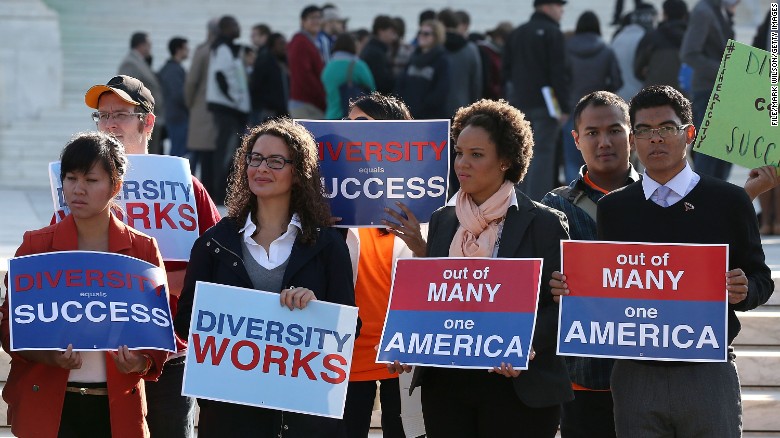Fisher v. Texas: Affirmative action at the University of Texas is constitutional, the Supreme Court rules

Affirmative action in college admissions has survived yet another Supreme Courtchallenge. The court ruled 4-3 on Thursday that the University of Texas at Austin's admissions procedures are constitutional, deciding Fisher v. Texas for the second time in three years, this time in the university's favor.
Justice Anthony Kennedy, writing for a four-justice majority that also included Ruth Bader Ginsburg, Sonia Sotomayor, and Stephen Breyer, concluded that the university's consideration of students' race was constitutional. (Here is the full opinion. Justice Elena Kagan recused herself because she did work related to the case during her time as Solicitor General.)
UT-Austin had specific goals for the diversity of its student body, and the majority was convinced by the university's argument that they could not achieve those goals in any other way.
UT-Austin's admission plan is somewhat unique. Kennedy cautioned that the university should continue to reevaluate the plan as more evidence emerges about its effects. And so the opinion itself doesn't make sweeping proclamations about how long affirmative action will be necessary, as former Justice Sandra Day O'Connor did with Grutter v. Bollinger in 2003.
Still, when the Court voted to take up the Fisher case for the second time in three years, many speculated that this would be the opinion that gutted the use of race in college admissions. Instead, the case was an outright win for the University of Texas and the court's liberals, although it reiterated to colleges that their affirmative action plans will have to meet high standards if challenged in court.
Why Abigail Fisher sued over the University of Texas's admissions policy
The case, Fisher v. Texas, challenged the University of Texas at Austin's admissions procedures. Most of its students are chosen by admitting the students at the top of every high school class in the state.
Because Texas's high schools are generally racially homogenous, that ensures a certain amount of racial diversity: The majority-black high schools send black students, the majority-Latino high schools send Latino students, and the majority-white high schools send white students.
But the university also admits some students who aren't in the top 10 percent of their high school class through another process, one that takes into account musical and athletic talent, as well as race and other factors. That's the process that was challenged by Abigail Fisher, who was denied admission through the so-called "holistic review."
Fisher has since graduated from Louisiana State University. But her challenge to the Fisher v. Texas: Affirmative action at the University of Texas is constitutional, the Supreme Court rules - Vox:

